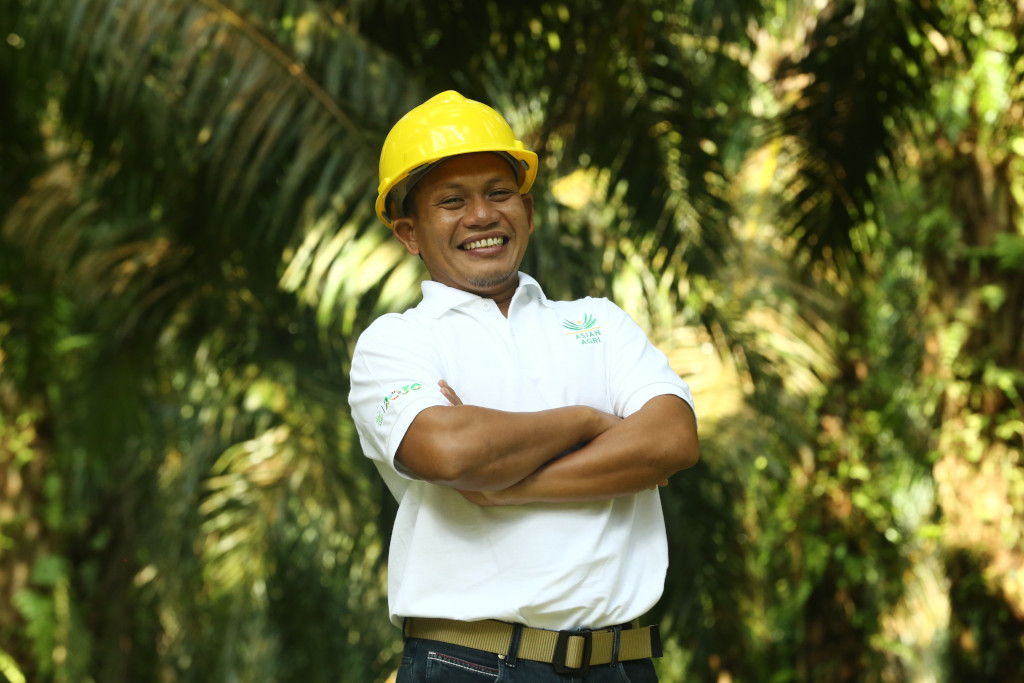JAKARTA – Khairul Anam, Chairman of the Tebing Tinggi Pangkatan Sejahtera Cooperative (KTTPS) from Tebing Tinggi Village, Labuhanbatu, North Sumatra Province, could not have foreseen the life-changing transformation that awaited him as a partner of Asian Agri.
Anam, an independent smallholder managing an oil palm plantation in Labuhanbatu, has been collaborating with Asian Agri since 2018. He Joined the SMILE Program (SMallholder Inclusion for Better Livelihood and Empowerment) in 2020, marking a pivotal moment in his journey.
As one of the companies with the most extensive partnerships with oil palm smallholders, Asian Agri has played a significant role in supporting independent smallholders like Anam to obtain globally recognized certifications. They have also imparted essential sustainability principles and provided training in Best Management Practices (BMP) for oil palm cultivation.
Anam’s success in applying sustainability principles to his oil palm plantation led him to Japan, where he became a panelist at the JaSPON x RSPO Conference in Chou City, Yaesu, Tokyo.
There, he addressed key stakeholders in the Japanese palm oil industry, highlighting the sustainable practices he had implemented and the improved well-being experienced by smallholders like himself.
Anam shared that his oil palm plantation was an inheritance from his parents. Initially, he lacked the knowledge and understanding to manage it effectively, which resulted in a somewhat haphazard approach to his business.
“I had to struggle to earn a sufficient income due to limited resources and minimal market access,” said Anam, who recently participated in a panel discussion titled “Inclusive Growth: Smallholders in Japan’s Palm Oil Value Chain” at the JaSPON x RSPO Conference on October 11-12, 2023.
It is important to note that independent smallholders like Anam play a crucial role in the palm oil supply chain in Indonesia. However, they are the most vulnerable link in this industry, unlike scheme smallholders. They lack support from corporate schemes, have limited access to financial services, and insufficient knowledge about implementing sustainability principles in their plantations. Consequently, their yields are lower, leading to reduced income, and without sustainable practices, their oil palm cultivation methods can potentially harm the environment.
According to the Central Bureau of Statistics in 2021, independent smallholders control more than 40 percent of the total 16.8 million[1] hectares of oil palm plantation land in Indonesia.
Anam’s success in improving his standard of living is expected to inspire other oil palm smallholders who face similar challenges, such as a lack of market access and bargaining power, limited financial access, and a lack of knowledge about sustainable oil palm cultivation practices.
The SMILE program is the result of a collaboration between Asian Agri, one of Asia’s largest palm oil companies, Apical, a global vegetable oil processor, and KAO Corporation, a chemical and cosmetics company based in Tokyo, Japan. The program aims to improve the welfare of independent smallholders and address barriers affecting their productivity through bolstering sustainable practices in oil palm plantations.
Given their significant contribution to the supply chain, it is crucial for independent smallholders like Anam to apply sustainable practices, ensuring their plantations avoid using slash-and-burn methods.
“After joining the SMILE program, the productivity of my oil palm plantation has significantly increased, and I can sell Fresh Fruit Bunches (FFB) at more reasonable prices,” said Anam.
“Before obtaining certification, the prices I received for FFB were ordinary, and I often had to struggle to obtain a more reasonable selling price. This made it difficult for me to support my family. However, after receiving the RSPO (Roundtable on Sustainable Palm Oil) certification, I can enjoy various benefits that have transformed my life.”
Anam added that he implemented sustainable practices and various efficiency techniques in his oil palm plantation to increase his yields.
Reaching this point was no easy feat for Anam, requiring unwavering consistency. After undergoing a series of RSPO audit processes, on July 15, 2022, Anam received the RSPO certificate. RSPO is a non-profit association that promotes sustainable production of palm oil.
“I have enjoyed several benefits that changed my life since I achieved RSPO certification through the SMILE Program. I apply sustainable practices and various techniques for efficiency in oil palm plantations to increase yield,” said Anam.
Before obtaining certification, Anam acknowledged that the average production from his oil palm plantation was only about one metric ton per hectare.
“After obtaining certification, my yield increased by 150 percent, reaching an impressive 2.5 metric tons per hectare, provided the weather was favorable and all preconditions were met,” he explained.
Anam proudly shared that they were able to expand their Cooperative from the sales proceeds and premiums of their certified palm oil. The Cooperative’s membership grew by 220% from 239 members to 775.
Anam and his colleagues at KTTPS are examples of independent smallholders who have successfully improved their standard of living after partnering with Asian Agri, a company that has been assisting independent smallholders since 1980.
Asian Agri supports both schemed and independent smallholders. All of Asian Agri’s schemed smallholders are RSPO-certified since 2017; they have also achieved International Sustainability and Carbon Certification (ISCC) since 2014.
Asian Agri’s first independent smallholder project, on the other hand, received RSPO certification in 2013.
To date, Asian Agri has helped certify nearly 3,000 independent smallholders, and the company’s goal, as outlined in its ‘Asian Agri 2030’ goals commit to assisting 5,000 independent smallholders achieve RSPO certification.
This commitment is a long-term business strategy aimed at achieving a sustainable palm oil industry aligned with the goals of the United Nations Sustainable Development Goals (UNSDGs).
This article was published in Katadata.
[1] Indonesia Oil Palm Statistics (BPS) 2021





